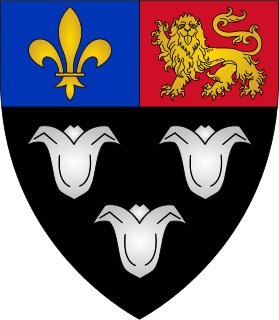Diplomatic history deals with the history of international relations between states. Diplomatic history can be different from international relations in that the former can concern itself with the foreign policy of one state while the latter deals with relations between two or more states. Diplomatic history tends to be more concerned with the history of diplomacy, but international relations concern more with current events and creating a model intended to shed explanatory light on international politics.

Vincent, Count Benedetti was a French diplomat. He is probably best known as one of the central figures in the instigation of the Franco-Prussian War.

The Triple Entente refers to the understanding linking the Russian Empire, the French Third Republic, and the United Kingdom of Great Britain and Ireland after the signing of the Anglo-Russian Entente on 31 August 1907. The understanding between the three powers, supplemented by agreements with Japan and Portugal, was a powerful counterweight to the Triple Alliance of Germany, Austria-Hungary, and Italy.
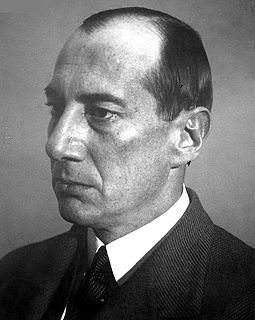
Józef Beck was a Polish statesman who served the Second Republic of Poland as a diplomat and military officer, and was a close associate of Józef Piłsudski. Beck is most famous for being Polish foreign minister in the 1930s, when he largely set Polish foreign policy.
Harold William Vazeille Temperley, was a British historian, Professor of Modern History at the University of Cambridge from 1931, and Master of Peterhouse, Cambridge.

Edward Mandell House was an American diplomat, politician, and an adviser to President Woodrow Wilson. He was known by the nickname Colonel House, although he had performed no military service. He was a highly influential back-stage politician in Texas before becoming a key supporter of the presidential bid of Wilson in 1912. Having a self-effacing manner, he did not hold office but was an "executive agent", Wilson's chief advisor on European politics and diplomacy during World War I (1914–18) and at the Paris Peace Conference of 1919. In 1919 Wilson, suffering from a series of small strokes, broke with House and many other top advisors, believing they had deceived him at Paris.
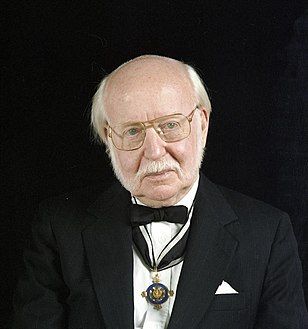
Gordon Alexander Craig was a Scottish-American historian of German history and of diplomatic history.
The Oxford English Dictionary defines economic warfare or economic war as involving "an economic strategy based on the use of measures of which the primary effect is to weaken the economy of another state".

Arthur Cayley Headlam was an English theologian who served as Bishop of Gloucester from 1923 to 1945.
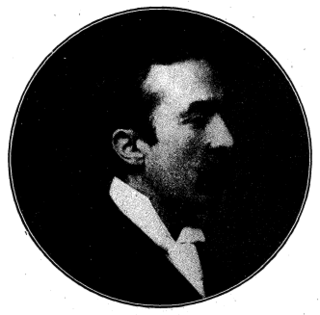
George Peabody Gooch was a British journalist, historian and Liberal Party politician. A follower of Lord Acton who was independently wealthy, he never held an academic position, but knew the work of historians of continental Europe.

The American entry into World War I came in April 1917, after more than two and a half years of efforts by President Woodrow Wilson to keep the United States out of the war.

Diplomacy is the art and practice of conducting negotiations between representatives of states. It usually refers to international diplomacy, the conduct of international relations through the intercession of professional diplomats with regard to a full range of topical issues. International treaties are usually negotiated by diplomats prior to endorsement by national politicians. David Stevenson reports that by 1900 the term "diplomats" also covered diplomatic services, consular services and foreign ministry officials.

This article covers worldwide diplomacy and, more generally, the international relations of the major powers from 1814 to 1919. The international relations of minor countries are covered in their own history articles. This era covers the period from the end of the Napoleonic Wars and the Congress of Vienna (1814–15), to the end of the First World War and the Paris Peace Conference. For the previous era see International relations, 1648–1814. For the 1920s and 1930s see International relations (1919–1939).
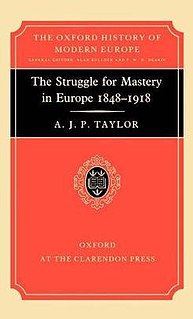
The Struggle for Mastery in Europe 1848–1918 is a scholarly history book by the English historian A. J. P. Taylor. It was part of "The Oxford History of Modern Europe" published by the Clarendon Press in Oxford in October 1954.
International relations (1919–1939) covers the main interactions shaping world history in this era, with emphasis on diplomacy and economic relations. The coverage here follows Diplomatic history of World War I and precedes Diplomatic history of World War II. The important stages of interwar diplomacy and international relations included resolutions of wartime issues, such as reparations owed by Germany and boundaries; American involvement in European finances and disarmament projects; the expectations and failures of the League of Nations; the relationships of the new countries to the old; the distrustful relations of the Soviet Union to the capitalist world; peace and disarmament efforts; responses to the Great Depression starting in 1929; the collapse of world trade; the collapse of democratic regimes one by one; the growth of economic autarky; Japanese aggressiveness toward China; Fascist diplomacy, including the aggressive moves by Mussolini's Italy and Hitler's Germany; the Spanish Civil War; the appeasement of Germany's expansionist moves toward the Rhineland, Austria, and Czechoslovakia, and the last, desperate stages of rearmament as another world war increasingly loomed.
The Diplomatic history of World War I covers the non-military interactions among the major players during World War I. For the domestic histories see Home front during World War I. For a longer-term perspective see International relations of the Great Powers (1814–1919) and Causes of World War I. For the following era see International relations (1919–1939). The major allied players included Great Britain, France, Russia, and Italy and the United States. The major Central Powers included Germany and the Austria-Hungary, and the Ottoman Empire (Turkey). Other countries—and their colonies—were also involved. For a detailed chronology see Timeline of World War I.
France entered World War I on August 3, 1914, when Germany declared war. France played only a small part in the diplomatic crisis of July 1914–its top leaders were out of the country from July 15 to July 29, when most of the critical decisions were taken. Austria and Germany deliberately acted to prevent the French and Russian leadership from communicating during the last week in July. But this made little difference as French policy in strong support of Russia had been locked in. Germany realized that a war with Russia meant a war with France, and so its war plans called for an immediate attack on France – through Belgium – hoping for a quick victory before the slow-moving Russians could become a factor. France was a major military and diplomatic player before and after the July crisis, and every power paid close attention to its role. Historian Joachim Remak says:

Germany entered into World War I on August 1, 1914, when it declared war on Russia. In accordance with its war plan, it ignored Russia and moved first against France–declaring war on August 3 and sending its main armies through Belgium to attack Paris from the north. The German invasion of Belgium caused Britain to declare war on Germany on August 4. Most of the main parties were now at war. In October 1914, Turkey joined the war on Germany's side, becoming part of the Central Powers. Italy, which was allied with Germany and Austria-Hungary before World War I, was neutral in 1914 before switching to the Allied side in May 1915.

Great Britain entered World War I on 4 August 1914 when the king declared war after the expiration of an ultimatum to Germany. the official explanation focused on protecting Belgian neutrality. The main reason, however, was to prevent a French defeat that would have left Germany in control of Western Europe.

